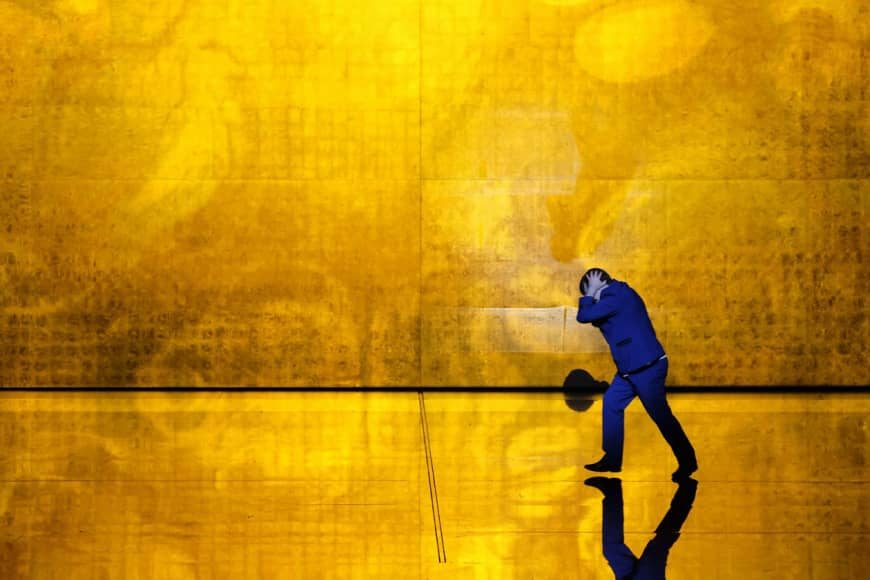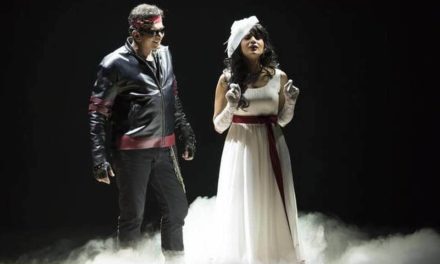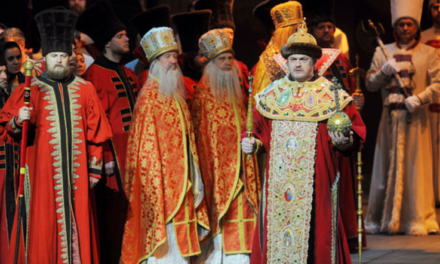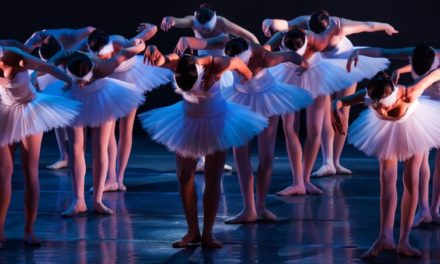A new opera based on the quintessentially Japanese novel Kinkakuji is set to open in Tokyo following a premiere held not in Kyoto, where the famed golden pavilion of its title is to be found, but at the Opera National du Rhin in Strasbourg, France.
In spring 2018, when it was staged in German with European singers by the theater director Amon Miyamoto, the work based on Yukio Mishima’s novel (The Temple Of The Golden Pavilion in English) and an earlier opera by Toshiro Mayuzumi, seemed to have lost little in translation.
Critic Victoria Okada wrote in the arts magazine, Toute la Culture: “Through this production, we find out that Miyamoto is an expert in both dramaturgy and theater.”
But as the globe-trotting dramatist says ahead of upcoming shows at Tokyo Bunka Kaikan in Ueno, he has long been fascinated by Mishima’s complex works, adding, “I always wanted to present his world on stage.”
This isn’t Miyamoto’s first production of Mishima’s 1956 novel which was inspired by a fire on July 2, 1950, in which the ancient three-story Kinkakuji was burned to the ground by a novice monk who then tried but failed to commit suicide.
In 2011, Miyamoto, who specializes in musicals but also lists contemporary drama, opera, kabuki, and noh among his more than 120 stagings, presented a straight play based on this work.
That production garnered positive reviews when it was performed in Tokyo, and again at the Lincoln Center in New York with English subtitles. Both times, Go Morita of pop group V6 played the central role of Mizoguchi, the stuttering young monk through whom Mishima explores beauty, sexuality, and his fears that Japan lost its essence when the Emperor renounced his divinity after World War II.
Comparing that production with this new opera being staged in Japan in German with Japanese and English subtitles, Miyamoto, 61, says, “My play faithfully followed the novel, but this (opera) is my version of the late composer Toshiro Mayuzumi’s interpretation of Kinkakuji. He wrote his opera for the Deutsche Oper Berlin in 1976, and it has very energetic, German-style music, though he also featured the chanting of sutras. So I’ve tried to create an entirely different world from mine, one that includes Mayuzumi’s vision of a Buddhist world.”
He adds that “it was quite a challenge to stage this German-style opera based on a Japanese novel for French audiences—even though Mishima said he loved French literature.”
Outlining the background to the Strasbourg premiere—which had an English conductor in Paul Daniel, music director of the Orchestre National Bordeaux Aquitaine, whose baton passes to 33-year-old Frenchman Maxime Pascal in Japan—he says, “When I got that great opportunity, I wanted to be sure I gave it a special French flair.”
“Basically, I felt there was a difference between what French and Japanese audiences expect from a new production,” he continues. “Especially if the story relates to Japan, audiences here look for common images of the country and culture that they all share, so they prefer a traditional direction for operas.
“In contrast, French audiences expect something they’ve never seen before, or a new interpretation if it’s a piece they know. They would boo a textbook, conventional performance,” he says with a laugh. “But also, because Mishima’s literature mixes lofty thoughts and earthiness, I think it’s a perfect fit to French people.
“On the music side, meanwhile, Mayuzumi had a lot of sutra chanting and I wanted to use that kind of haunting chorus to make an illusory and contradictory world on stage.”
Elaborating on this, the director says that unlike the novel, which is chronological, the opera portrays Mizoguchi’s recollections. To do so, it uses fleeting images and color changes to journey from the moment he starts the fire back through his life and his warped imagination before returning to him striking the match.
Consequently, although the women wear kimono and the men are in Western-style postwar clothes, the stage set otherwise isn’t realistic. Instead, it represents a depressing, dark world—including the image of an atom bomb explosion juxtaposed with a glittering, golden backdrop.
“In Japan, there are more people who’ve read the book so this may not be their cup of tea,” Miyamoto says. “However, I hope some people will still enjoy this fresh and unique interpretation of the Kinkakuji story.”
Thanks to “the power of its great music,” he says he feels sure the opera will “reveal a magnificent philosophical world that depicts Mizoguchi’s internal turmoil set against postwar chaos. And it makes you consider where real value resides: with the intangible gods … or the magnificent, gilded Kinkakuji.”
Miyamoto also introduces an intriguing extra dimension by creating an additional, nonverbal role of the arsonist as a boy. Double-cast between Haruto Maeda (one of the Billy Elliots in the hit musical) and Yujin Kinoshita, the child accompanies Mizoguchi (double-cast between Masumitsu Miyamoto and Kei Yonashiro) and expresses his feelings through his movements and facial expressions in ways set to break new ground in opera.
Explaining his rationale for introducing the new character, Miyamoto says, “The protagonist always has a few different personalities in his mind as he struggles with life, so the boy reminds him of his past when all he wanted was to see the beauty of the temple. Finally, that pure figure is eliminated as Mizoguchi resolves to burn it down.
“In the final scene, the gigantic golden walls move toward (Mizoguchi) as Kinkakuji becomes a living creature … but that’s all I’ll say. To find out what’s next, please enjoy it in the theater,” he says.
This article originally appeared in The Japan Times on February 12, 2019, and has been reposted with permission.
This post was written by the author in their personal capacity.The opinions expressed in this article are the author’s own and do not reflect the view of The Theatre Times, their staff or collaborators.
This post was written by Nobuko Tanaka.
The views expressed here belong to the author and do not necessarily reflect our views and opinions.


















